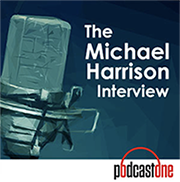 WOR Morning Co-Host Michael Riedel is This Week’s Guest on Harrison Podcast. The co-host (with Len Berman) of the WOR, New York morning show, Michael Riedel is this week’s guest on the award-winning PodcastOne series, “The Michael Harrison Interview.” Their successful show, now in its fifth year, combines a left-right political element with sports and arts & entertainment. Riedel is a moderate conservative and Berman is a liberal.
WOR Morning Co-Host Michael Riedel is This Week’s Guest on Harrison Podcast. The co-host (with Len Berman) of the WOR, New York morning show, Michael Riedel is this week’s guest on the award-winning PodcastOne series, “The Michael Harrison Interview.” Their successful show, now in its fifth year, combines a left-right political element with sports and arts & entertainment. Riedel is a moderate conservative and Berman is a liberal. They regularly engage in friendly political debate and banter. In addition, both bring their background interests to the table. Berman is a former sports talk personality and Riedel is an established Broadway theater critic as well as a best-selling author. Harrison and Riedel engage in an interesting cell phone conversation examining New York City’s recovery from the economic and public safety issues imposed by the pandemic, plus the state of Broadway theater, cinema and presidential politics. To listen to the podcast in its full eclectic glory, please click here.
They regularly engage in friendly political debate and banter. In addition, both bring their background interests to the table. Berman is a former sports talk personality and Riedel is an established Broadway theater critic as well as a best-selling author. Harrison and Riedel engage in an interesting cell phone conversation examining New York City’s recovery from the economic and public safety issues imposed by the pandemic, plus the state of Broadway theater, cinema and presidential politics. To listen to the podcast in its full eclectic glory, please click here.
Clay Travis & Buck Sexton Show to Commemorate Rush Limbaugh Today. On today’s edition of Premiere Networks’ “The Clay Travis & Buck Sexton Show,” the hosts will honor the legacy of Rush Limbaugh on the one-year anniversary of his death. The hosts say they will “reflect on Limbaugh’s ‘way of life,’ as he often described it, and the inspiration and motivation he brought to millions of fans.” Travis and Sexton will “demonstrate how prescient ‘America’s Anchorman’ was and continues to be on the issues of the day, showcasing highlights and accurate predictions from his award-winning program.” The show will also feature notable on-air moments from Limbaugh’s 30-plus year career, listener memories, and special appearances by family, former staff and fellow broadcasters, including: Limbaugh’s wife Kathryn; long-time call screener and “official show observer” James Golden; frequent guest hosts Mark Steyn and Todd Herman; and national radio and TV personality Sean Hannity.
death. The hosts say they will “reflect on Limbaugh’s ‘way of life,’ as he often described it, and the inspiration and motivation he brought to millions of fans.” Travis and Sexton will “demonstrate how prescient ‘America’s Anchorman’ was and continues to be on the issues of the day, showcasing highlights and accurate predictions from his award-winning program.” The show will also feature notable on-air moments from Limbaugh’s 30-plus year career, listener memories, and special appearances by family, former staff and fellow broadcasters, including: Limbaugh’s wife Kathryn; long-time call screener and “official show observer” James Golden; frequent guest hosts Mark Steyn and Todd Herman; and national radio and TV personality Sean Hannity.
Superadio and Mean Ole Lion Media Partner for Podcast Division. Syndication and sales firm Superadio, LLC announces a partnership with podcast network Mean Ole Lion Media, in which Superadio will serve as the sales and marketing arm focusing on audience growth and monetization. Mean Ole Lion Media positions itself as a place “Where Content is King And Black and Brown Voices Truly Matter.” Superadio says it is launching its podcast division with over 14 Mean Ole Lion Media shows that speak directly to issues affecting Black America, including “Oh That’s Deep,” “Black Women Conversations,” “Business of the Beat,” “The Overlooked” and “Conversations with Dr. Ian Smith.” Mean Ole Lion Media founder Ken Johnson says, “This partnership is the result of mutual admiration and respect for Superadio. Their passion for content is completely in line with Mean Ole Lion Media. The company’s standing in urban radio and their existing content targeting African Americans is an excellent complement to our efforts in the podcast arena.”
is launching its podcast division with over 14 Mean Ole Lion Media shows that speak directly to issues affecting Black America, including “Oh That’s Deep,” “Black Women Conversations,” “Business of the Beat,” “The Overlooked” and “Conversations with Dr. Ian Smith.” Mean Ole Lion Media founder Ken Johnson says, “This partnership is the result of mutual admiration and respect for Superadio. Their passion for content is completely in line with Mean Ole Lion Media. The company’s standing in urban radio and their existing content targeting African Americans is an excellent complement to our efforts in the podcast arena.”
Edison Research and Ad Results Media Present Super Listeners Study Results. Super listeners are defined by Edison Research as American adults who listen to five or more hours of podcasts weekly. In the third annual Super Listener Study from Edison and Ad Results Media, the data indicates that Super Listeners are spending an average of 11.2 hours listening to podcasts weekly, up from 10.5 hours last year and 9.8 hours the year before. Other findings include: 51% of podcast Super Listeners agree that they pay more attention to ads on podcasts than on other media, up from 48% last year;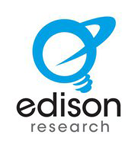 53% of podcast Super Listeners agree that their opinion of a company is more positive when it is on a podcast they regularly listen to, up from 49% last year; 50% of podcast Super Listeners agree that advertising on a podcast is the best way for a brand to reach them, up from 49% last year. Also, the study finds that Super Listeners are continuing to notice an increase in the number of commercials and length of ad breaks in podcasts with 59% saying the total number of ads in the podcast they regularly listen to has increased, up from 56% last year. This year’s study saw an increase in the number of Super Listeners who believe it is important or very important to limit their exposure to advertising, up to 59% from 50% from last year. Edison Research SVP Tom Webster says, “It’s clear that podcasting’s most active consumers are both difficult to reach through traditional means of advertising, and also extremely receptive to the right message, in the right context, in their favorite podcasts. The podcast industry has an incredible opportunity to be a trusted means of access to an extremely valuable subset of consumers.” Find out more here.
53% of podcast Super Listeners agree that their opinion of a company is more positive when it is on a podcast they regularly listen to, up from 49% last year; 50% of podcast Super Listeners agree that advertising on a podcast is the best way for a brand to reach them, up from 49% last year. Also, the study finds that Super Listeners are continuing to notice an increase in the number of commercials and length of ad breaks in podcasts with 59% saying the total number of ads in the podcast they regularly listen to has increased, up from 56% last year. This year’s study saw an increase in the number of Super Listeners who believe it is important or very important to limit their exposure to advertising, up to 59% from 50% from last year. Edison Research SVP Tom Webster says, “It’s clear that podcasting’s most active consumers are both difficult to reach through traditional means of advertising, and also extremely receptive to the right message, in the right context, in their favorite podcasts. The podcast industry has an incredible opportunity to be a trusted means of access to an extremely valuable subset of consumers.” Find out more here.
iHeartMedia and Sounder Partner for Podcast Brand Safety Tools. A deal between iHeartMedia and audio intelligence platform Sounder is struck that allows iHeartMedia to “leverage Sounder’s Audio Data Cloud to provide both established and emerging podcast creators the best AI and Machine Learning tools to help them gain critical, real-time insights to accelerate growth and improve monetization.” iHeartMedia chief data officer Brian Kaminsky says, “As the leader in podcasting, the iHeartPodcast Network hosts the most diverse group of high-quality creators in the world and produces the most podcasts that generate over one million plus downloads. It’s critical that we learn from the challenges advertisers have had with video and social media to deliver safety tools and controls that allow brands to customize their campaigns and ensure that their ads will be delivered at scale in a brand safe environment. Our partnership with Sounder underscores our commitment to innovation in audio advertising and our goal of creating more meaningful connections between advertisers and listeners. In addition to simple brand safety, this partnership will also unlock brand suitability tools that will dynamically align brands with content and creator-sentiments that supports their goals and objectives.” In addition to this commercial partnership, iHeartMedia has also announced a strategic investment in Sounder, as lead investor in the company’s Series A round.
hosts the most diverse group of high-quality creators in the world and produces the most podcasts that generate over one million plus downloads. It’s critical that we learn from the challenges advertisers have had with video and social media to deliver safety tools and controls that allow brands to customize their campaigns and ensure that their ads will be delivered at scale in a brand safe environment. Our partnership with Sounder underscores our commitment to innovation in audio advertising and our goal of creating more meaningful connections between advertisers and listeners. In addition to simple brand safety, this partnership will also unlock brand suitability tools that will dynamically align brands with content and creator-sentiments that supports their goals and objectives.” In addition to this commercial partnership, iHeartMedia has also announced a strategic investment in Sounder, as lead investor in the company’s Series A round.
Alliance for Women in Media and Foundation Announce Board Members and Officers. The Alliance for Women in Media and the Alliance for Women in Media Foundation announce their 2022 boards of directors and officers. Heather Cohen, EVP, The Weiss Agency begins her second term as chair of the boards. iHeartMedia EVP Thea Mitchem joins the AWM board. Marie Tedesco, CFO, Beasley Media Group joins the AWM board, and Audacy SVP of digital audio content Tim Clarke joins the AWM Foundation board. The organizations also announce that McVay Media president Mike McVay, Radio Ink/RBR-TVBR publisher Deborah Parenti, and Katz Radio Group president Christine Travaglini continue their Foundation board terms.
EVP, The Weiss Agency begins her second term as chair of the boards. iHeartMedia EVP Thea Mitchem joins the AWM board. Marie Tedesco, CFO, Beasley Media Group joins the AWM board, and Audacy SVP of digital audio content Tim Clarke joins the AWM Foundation board. The organizations also announce that McVay Media president Mike McVay, Radio Ink/RBR-TVBR publisher Deborah Parenti, and Katz Radio Group president Christine Travaglini continue their Foundation board terms.
TALKERS News Notes. The WAMU, Washington-produced and NPR-syndicated daily talk program “1A” will soon launch “1A Remaking America” – a “major, two-year reporting project covering the threats to America’s democracy.” The program is being funded by a grant totaling $750,000 from the Corporation for Public Broadcasting and takes place in partnership with several public media stations across the country. The project “will focus coverage on the growing political divides throughout the country.” WAMU/DCist chief content officer Monna Kashfi says, “We are very excited to embark on a new reporting initiative with our partner stations, convening the difficult but crucial conversations about where we are headed as a nation after the unprecedented reality of the past two years. The support from CPB will make it possible for us to share stories and voices from across the country in new and meaningful ways, and we are grateful for their trust in our vision.”…..A number of Audacy’s Pennsylvania radio stations have been honored with Pennsylvania Association of Broadcasters 2022 Excellence in Broadcasting Awards. A few of those include all-news KYW, Philadelphia winning Outstanding Use of Digital Media for its Hurricane Ida Continuing Coverage; news/talk KDKA-AM winning Outstanding Use of Digital Media for its High School Football Game of the Week Coverage; and news/talk WILK, Wilkes-Barre winning Outstanding Radio Public Affairs Program/Program Series for its Special Edition of May 22…..Contemporary Christian network WayFM names Robyn Sedgwick general manager for Colorado and Kansas and Mike Weston as station manager – Denver. Both begin their roles on March 1 and are filling roles that were occupied by longtime Way Media regional manager Zach Cochran, who departed in December to become CEO of The Family Radio Network in Wisconsin…..The nationally syndicated “Motley Fool Radio” program hosted by Chris Hill adds new affiliate WPMO, Pascagoula, Mississippi to its roster of stations.
Ukraine Tensions, Durham Probe, CNN Troubles, COVID-19, Midterms/Trump & the GOP, Inflation, Prince Andrew Settlement, and Beijing Olympics Among Top News/Talk Stories Yesterday (2/16). The threat of war over Russia’s military buildup at the Ukraine border; special counsel John Durham’s investigation into allegations of Hillary Clinton’s digital spying on Donald Trump; CNN announces that a third-party investigation found Jeff Zucker, Allison Gollust, and Chris Cuomo violated the company’s standards; the rate of COVID-19 cases in the U.S., the planned relaxing of mask mandates in numerous states, and the truckers’ protests; the battle for control of Congress in November’s midterm elections and Donald Trump’s influence over the GOP; the worst inflation rate in the U.S. since the 1970s; Prince Andrew agrees to settle with accuser Virginia Guiffre; and the politics behind the Beijing Winter Olympics were some of the most-talked-about stories on news/talk radio yesterday, according to ongoing research from TALKERS magazine.

WDEL, Wilmington Seeks Talk Host. The Forever Media news/talk station is seeking a talk host. The company says, “WDEL-AM/FM is looking for the next great talk show host. We’re not looking for typical red vs. blue talk. We want a big personality who is interesting, entertaining, can focus on local issues while explaining the world we live in – and have fun! Someone who takes the news seriously, but not themselves.” Send examples of your work to: careers@forevermediainc.com.
host. We’re not looking for typical red vs. blue talk. We want a big personality who is interesting, entertaining, can focus on local issues while explaining the world we live in – and have fun! Someone who takes the news seriously, but not themselves.” Send examples of your work to: careers@forevermediainc.com.
FOX News Media Seeks Freelance Producer/News Editor. This opportunity as a freelance producer/news editor with FOX News Media is based in New York. It includes supervising the staff for FOX’s network radio news operations (terrestrial and FOX News Headlines 24/7 – Channel 115 on SiriusXM Radio). As the freelance producer/news editor you are the editorial leader, working with news anchors to craft the content and structure of a 24/7 news operation. This is fast-moving news environment! Your ability to thrive in a fast-paced, deadline-driven newsroom allows you to deliver top-quality segments/newscasts. You excel at multi-tasking and pay close attention to details. Your writing and editing skills are excellent and your editorial judgment is first-rate. See more about the position and apply here.
News Headlines 24/7 – Channel 115 on SiriusXM Radio). As the freelance producer/news editor you are the editorial leader, working with news anchors to craft the content and structure of a 24/7 news operation. This is fast-moving news environment! Your ability to thrive in a fast-paced, deadline-driven newsroom allows you to deliver top-quality segments/newscasts. You excel at multi-tasking and pay close attention to details. Your writing and editing skills are excellent and your editorial judgment is first-rate. See more about the position and apply here.
Freelance Audio Network Operator and Podcast Production Operator Position Open. This FOX News Radio position is based in New York City. The company says: “FOX News is committed to delivering news as it happens. We love what we do and we’re looking for passionate, talented people to help us lead, grow and achieve our goals. Joining the number one cable news network in America is a singular opportunity to be part of a highly successful, dynamic team that has transformed the way people get their information.” This is an opportunity for a technically strong and motivated freelance audio network operator and podcast production operator. The successful candidate will provide technical oversight over all FOX News Radio platforms including FOX News Radio’s terrestrial operation, FOX News Talk, and FOX News Headlines 24/7. See more about the position and apply here.
Share this with your network
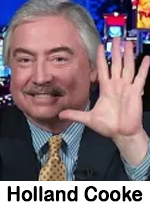 I asked ChatGPT: “Vendors are now offering radio stations a service that delivers advertising commercial copy generated by AI. Because AI draws from what’s already been done, this risks sound-alike scripts. Is there a list of commercial clichés users should instruct AI to exclude?”
I asked ChatGPT: “Vendors are now offering radio stations a service that delivers advertising commercial copy generated by AI. Because AI draws from what’s already been done, this risks sound-alike scripts. Is there a list of commercial clichés users should instruct AI to exclude?”



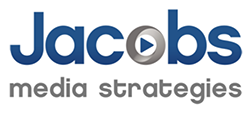 respondents are most likely to say they use it at least weekly. There’s a strong feeling the government will need to step in to provide legal guard rails for AI use. Three in four (75%) are looking for some form of regulation. In fact, more than a third (36%) believe AI will need to be highly regulated. That perception may be fueled by the upcoming elections this November. About half (51%) say they’re very concerned about how AI might affect this fall’s political races. Members of the Greatest Generation and Boomers are most fearful of how the technology might influence upcoming elections. When it comes to three applications for radio – AI hosts, AI-voiced commercials, and AI-voiced station IDs – the biggest pushback predictably is directed at the idea of radio using cloned voices to take the place of live talent. Three in four (75%) raise the red flag over this AI application. Concern lessens when it comes to AI voice technology being used to read commercials. Still, nearly four in ten (39%) say they have big issues with radio stations they listen to using AI in ads. Respondents are most open to the idea of AI voices being utilized on station identification. Overall, about one-third (34%) have no problem, but a similar sized group (30%) expresses major concerns with this use case for AI. Jacobs Media general manager Paul Jacobs remarks, “It is still early days for AI in radio, but broadcasters need to respect the many concerns voiced by core fans of the medium. Up to now, many decisions have been made in a vacuum. Now the audience has a voice. We’ll be tracking their perceptions in Techsurveys in the coming years as the technology matures. The format level data for AI should provide welcome feedback for radio managers trying to get a handle on AI.”
respondents are most likely to say they use it at least weekly. There’s a strong feeling the government will need to step in to provide legal guard rails for AI use. Three in four (75%) are looking for some form of regulation. In fact, more than a third (36%) believe AI will need to be highly regulated. That perception may be fueled by the upcoming elections this November. About half (51%) say they’re very concerned about how AI might affect this fall’s political races. Members of the Greatest Generation and Boomers are most fearful of how the technology might influence upcoming elections. When it comes to three applications for radio – AI hosts, AI-voiced commercials, and AI-voiced station IDs – the biggest pushback predictably is directed at the idea of radio using cloned voices to take the place of live talent. Three in four (75%) raise the red flag over this AI application. Concern lessens when it comes to AI voice technology being used to read commercials. Still, nearly four in ten (39%) say they have big issues with radio stations they listen to using AI in ads. Respondents are most open to the idea of AI voices being utilized on station identification. Overall, about one-third (34%) have no problem, but a similar sized group (30%) expresses major concerns with this use case for AI. Jacobs Media general manager Paul Jacobs remarks, “It is still early days for AI in radio, but broadcasters need to respect the many concerns voiced by core fans of the medium. Up to now, many decisions have been made in a vacuum. Now the audience has a voice. We’ll be tracking their perceptions in Techsurveys in the coming years as the technology matures. The format level data for AI should provide welcome feedback for radio managers trying to get a handle on AI.”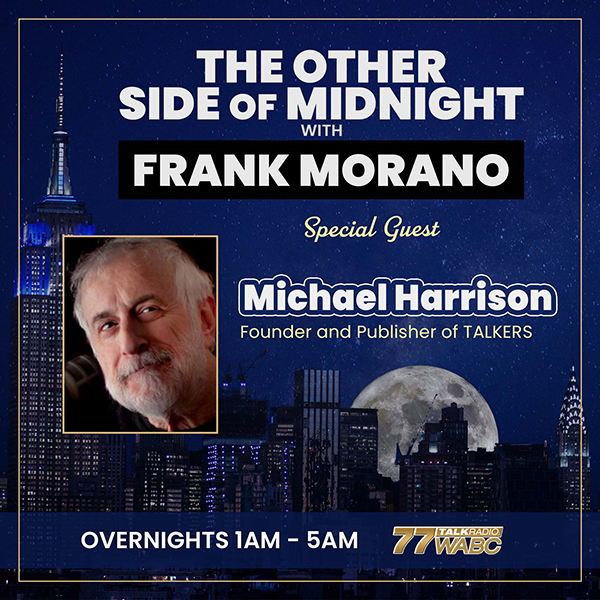
 questions as it did answers about what young broadcasters entering professional media today should be prepared for in navigating the unpredictably turbulent waters of the next decade and beyond. Among the sweeping panorama of topics covered in his address, Harrison told the students, “When looking to the future, don’t be too sure that current events will follow a predictable script. There are always ‘black swan events’ that change the storyline and our expectations in an instant. Plus, there are multiple outcomes, possibilities, and forks in the road for almost every situation.” Regarding the current focus on artificial intelligence, Harrison advised, “All technology is a double-edged sword and AI will prove to be a particularly consequential one with both positive and negative implications. However, don’t fall into the age-old trap of thinking that productions and performances created or enhanced by new technology are necessarily ‘artificial’ or ‘fake.’ New tools not only create new art, they have an irrepressible influence on giving rise to new culture. The immediate years ahead are likely going to provide us with the challenging question of ‘what does it mean to be truly human?’” Harrison concluded, “As young broadcasting students in 2024 looking to make a difference in the world, be prepared to face the challenge of following your dreams, ideals and inspiration while confronting the harsh realities of making a living in a stressed environment of relentless change. We live our lives in this business at the dangerous intersection between art and commerce.”
questions as it did answers about what young broadcasters entering professional media today should be prepared for in navigating the unpredictably turbulent waters of the next decade and beyond. Among the sweeping panorama of topics covered in his address, Harrison told the students, “When looking to the future, don’t be too sure that current events will follow a predictable script. There are always ‘black swan events’ that change the storyline and our expectations in an instant. Plus, there are multiple outcomes, possibilities, and forks in the road for almost every situation.” Regarding the current focus on artificial intelligence, Harrison advised, “All technology is a double-edged sword and AI will prove to be a particularly consequential one with both positive and negative implications. However, don’t fall into the age-old trap of thinking that productions and performances created or enhanced by new technology are necessarily ‘artificial’ or ‘fake.’ New tools not only create new art, they have an irrepressible influence on giving rise to new culture. The immediate years ahead are likely going to provide us with the challenging question of ‘what does it mean to be truly human?’” Harrison concluded, “As young broadcasting students in 2024 looking to make a difference in the world, be prepared to face the challenge of following your dreams, ideals and inspiration while confronting the harsh realities of making a living in a stressed environment of relentless change. We live our lives in this business at the dangerous intersection between art and commerce.”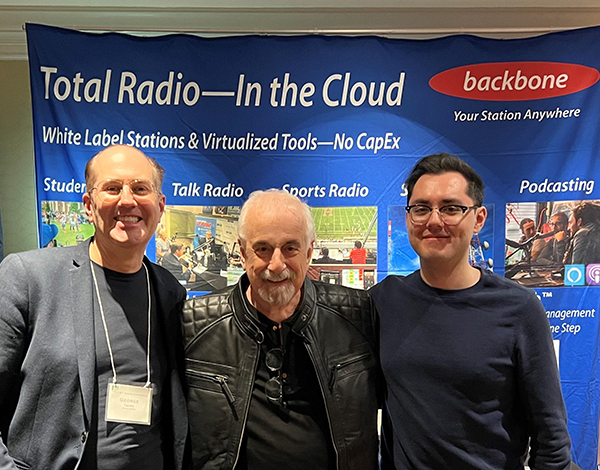
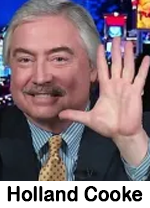 After post-consolidation cutbacks have whacked local on-air content, there’s now angst that Artificial Intelligence can – literally – dehumanize radio (and other media – HUGE issue in the SAG-AFTRA strike). Voice cloning is child’s play; and several vendors are already peddling AI gimmicks to radio stations.
After post-consolidation cutbacks have whacked local on-air content, there’s now angst that Artificial Intelligence can – literally – dehumanize radio (and other media – HUGE issue in the SAG-AFTRA strike). Voice cloning is child’s play; and several vendors are already peddling AI gimmicks to radio stations.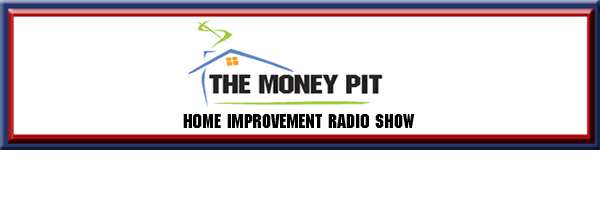
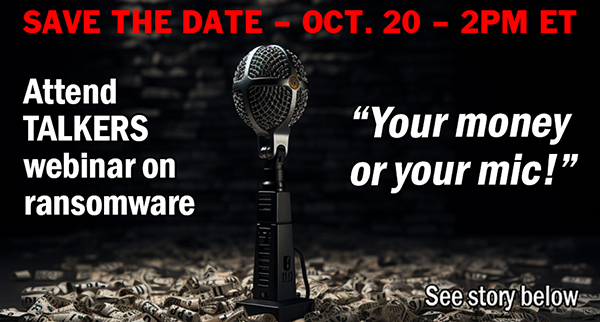
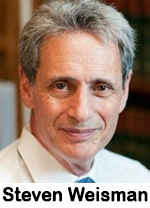 radio and media company personnel focusing on where broadcasters are vulnerable and steps that should be taken to become more secure as well as comply with federal regulations. The 90-minute webinar will take place on Friday, October 20 at 2:00 pm ET.
radio and media company personnel focusing on where broadcasters are vulnerable and steps that should be taken to become more secure as well as comply with federal regulations. The 90-minute webinar will take place on Friday, October 20 at 2:00 pm ET.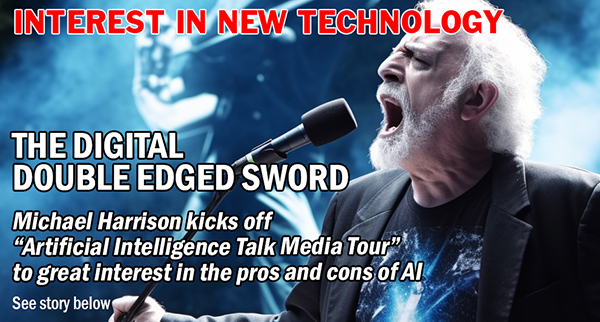
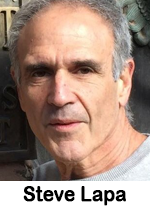 It’s that time of year. College graduates are pushing out resumes. Are you open for entry level sellers? Any turnover on your sales team this year?
It’s that time of year. College graduates are pushing out resumes. Are you open for entry level sellers? Any turnover on your sales team this year? Last week I had the privilege of moderating a panel at the TALKERS conference. Confession: I listen to speech patterns and tones more than words.
Last week I had the privilege of moderating a panel at the TALKERS conference. Confession: I listen to speech patterns and tones more than words.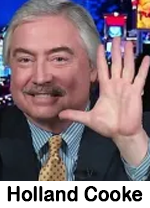 How will AI tools like ChatGPT impact the way we work? The clues are everywhere. Several client stations have automated weather, and even with your consultant’s trained ear, I had to ask. And yes, she’s a robot.
How will AI tools like ChatGPT impact the way we work? The clues are everywhere. Several client stations have automated weather, and even with your consultant’s trained ear, I had to ask. And yes, she’s a robot.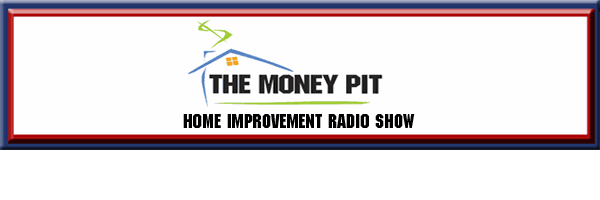
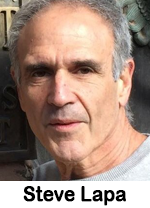 Have you picked up the most recent buzz around Artificial Intelligence? It’s hard to miss it.
Have you picked up the most recent buzz around Artificial Intelligence? It’s hard to miss it.





